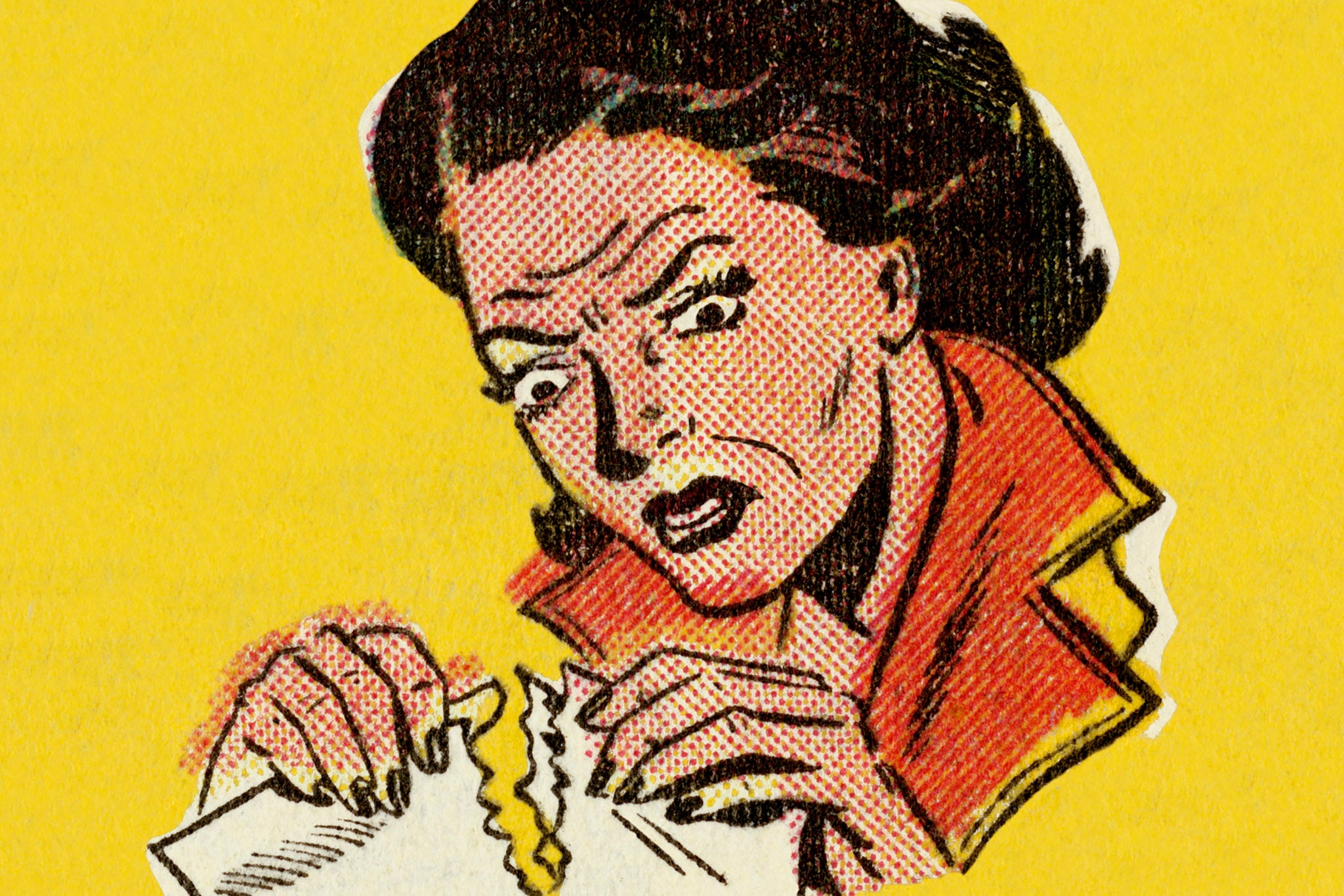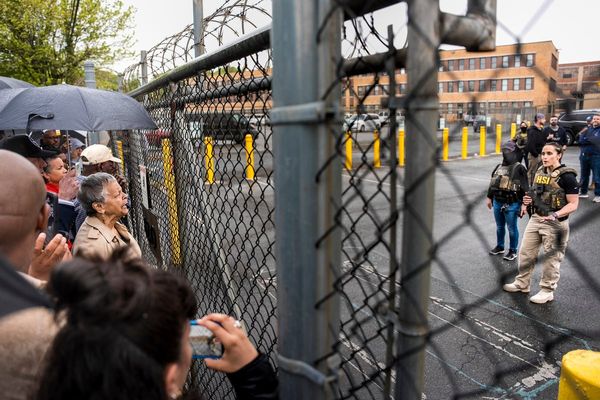
When was the last time you felt angry? Actually, that’s the wrong question. When was the last time you felt angry – like, a screaming, wailing kind of anger – and really let it out? It’s an early Saturday morning in May, and as I put these questions to myself on the Tube to north London, I draw a blank. I see myself as being pretty in tune with my emotions, yet anger isn’t one I ever really experience. Today might change that, I think, and my stomach churns nervously.
Google Maps leads me to a very nice but very normal home in a residential area near Alexandra Palace. Yet as I step through the door and am hit with the heady scent of incense and the sound of gongs – I spy a cabinet brimming with gemstones, too – it becomes clear that this place will require me to let go of my cynicism towards all things hippie. I’m here for a “women’s anger transformation day retreat” run by Love Your Rage, a group of spiritual practitioners helping women harness their fury. I soon realise I have no idea what I’ve let myself in for.
Everyone feels anger, yet it’s often deemed an ugly emotion, and studies show that women in particular have trouble expressing it. It’s not that women don’t feel that rage; at a time when our rights and those of our loved ones are being stripped away, we have more to be angry about than ever. Yet time and time again, research has found that modern women are less likely to express their fury than men.
Maybe it was some primal need to let my anger out that made me notice the Love Your Rage poster on the bathroom wall in an east London community sauna a few weeks ago. Or maybe it was a borderline voyeuristic nosiness to know what the hell goes on in a women’s anger workshop. And I knew I’d never get the answer unless I rolled up my sleeves – or perhaps, my linen trousers – and got involved.
Because, despite what the words “east London community sauna” might imply, I’ve historically been pretty sceptical of all things woo-woo. So when the retreat itinerary is sent out in advance and my eyes are drawn to the item listing a “cuddle puddle”, I push back on my instinctual snark. You’re there to fully participate, I tell myself. You won’t get anything out of it if you don’t. That’s why, when I send a screenshot of the day’s lineup to my most spiritually attuned friend (a drama therapist who brings goddess-themed tarot cards to most social occasions), I add that as wild as it all sounds, I’m going to really try and not be cynical. “Don’t try and be anything,” she replies. “Trust the process.”
The woman who approaches me at Love Your Rage smiles warmly, checking my name off the list and showing me the bright space, where we can make a coffee, eat a biscuit, or flick through three different books about crystals before the event begins. A series of dots and lines painted in white adorn her brow; I assume they signify some religious practice, but am later told they’re just a fun thing the day’s facilitators like to do to mark themselves out from the attendees.
I am beating my forearms into the pillow, just like we practised as a group, and suddenly twig that I am screaming for real. The feeling is disarming. Dazed, I push forward. Amid the general wailing, I catch snatched words and phrases clearly pertaining to these women’s specific trauma and a huge sob surfaces from within me.
While the retreat starts with a short opening ceremony outside in the sun, the main action takes place indoors. In the main room, a circle of cushions are laid out upon the expensive-looking parquet floor, with colourful boxes of tissues pushed to the side, winking at what’s to come. Given the cost of the event (at £140 for a full-price ticket and lower for those on low wages or from ethnic minorities, this is no cheap day out), I’m expecting a crowd of rich white women, but the group surrounding me are far more diverse. It quickly becomes clear, through conversation, that I am the least spiritually experienced of the lot. If there is a place for me to tap into my hippie self without fear of judgement, this is it.
Sat cross-legged, the four facilitators (a mixture of yoga and pole dancing teachers, masseuses and psychotherapists) introduce themselves. One of the leaders has just returned from a six-month trip to India to reconnect with her ancestors. She explains that the retreat takes inspiration from the practices she learnt there, as well as different spiritual rituals from across the globe. The word “portal” comes up a lot. Things might end up getting “slightly intense”, one of the facilitators explains, and they glance at one another and share a conspiratorial giggle. But it’s nothing to be afraid of. We might feel an inclination to help others going through anything particularly powerful, but that’s for the facilitators to deal with; otherwise, we should leave each other to feel our emotions.
To jumpstart our participation, we are each given two timed minutes to talk about our relationships with anger. The tissue boxes are pushed into the circle – and not for the first time today. What surprises me is how immediately emotional it is: not just the talking, but the listening too. I’ve not really planned what I’m going to say, and am surprised to hear my voice crack when the feather-covered talking stick is passed to me.
I ramble about my relationship with anger, and how, if I’m honest, I’m not sure I really have one. I’m not confrontational, but I am non-non-confrontational – that’s the line I always go with – and would rather just talk out an interpersonal conflict than sit in any feelings of frustration. I do feel a lot of rage towards the world, for sure, but it feels so unwieldy and overpowering that I’ve retreated from it as a means of preservation. Ideally, I’d like to learn to extract anger from the pain and fear it’s often tied up in, because I don’t want to lose that motivating fire beneath me. When I look up, all the women are smiling at me. Some nod. I feel understood.

The facilitators then describe the itinerary for the day. First up is a “somatic anger therapy” session, whatever that is, then we break for a vegan lunch. We’ll return for group art therapy, followed by a sound bath and another sharing circle. All, beyond lunch, are new to me, and the first proves to be the most intense of all. It will consist of four different practices of “active meditation”, beginning with expelling breath from the nose in short, sharp blasts for 10 minutes and ending with jumping on the spot and shouting before a free movement-slash-dance session.
The middle section, however, is where the rage really comes in, and we’re shown and practise different “anger activation” movements using a cushion: pillow bashing, pillow hitting, pillow screaming, or tantruming. There’s also the option of “pillow humping”, thrusting the pelvis forward in a move that naturally prompts the most laughs and shared looks conveying: “Am I really about to do this? I guess I am.”
On a practical level, every base is covered, with the obligatory safety rules, adjustments for any injuries, and instructions on what to do if we feel overwhelmed. Yet it’s still hard to imagine what this will look like, let alone how it will make me feel. There’s an encouragement to make whatever noises come naturally throughout, but if they don’t, faking it will work too. These words settle my nerves slightly. All of this is so out of my comfort zone, it’s somewhat reassuring to know a hypothetical other attendee might not find this so instinctive either.

The lights dim, a calming soundtrack plays, and we begin. The nose breathing section is a little odd (the tissues, so far only used to mop up leaky eyes, are reassigned for us hayfever sufferers in the group), and when it ends I don’t quite know how we’re supposed to transition into the anger activation section. The correct answer, of course, is that we’re not “supposed to” do anything, but the choice of movements is overwhelming. I try not to focus on others, but I can sense that some people are smashing their cushions onto the ground, so I gingerly grab my own and start whacking it down. Everyone else is screaming. I should scream too, right? I try, and it feels so unlike me; not inauthentic per se, but untapped.
The point at which something shifts is hard to pinpoint. All I know is, I am beating my forearms into the pillow, just like we practised as a group, and suddenly twig that I am screaming for real. The feeling is disarming. Dazed, I push forward. Amid the general wailing, I catch snatched words and phrases clearly pertaining to these women’s specific trauma and a huge sob surfaces from within me. The bizarre realisation arises that it is these women I am raging for; in a moment of catharsis, their fury has given me leave to express mine. I am so, so angry on their behalf, and while that might sound like some holier-than-thou thing, I don’t think it is. Rather, it is a feeling of collective pain, and one that does feel intrinsically gendered. I am f***ing furious that women have to go through what they go through.
The section ends at some point, and we move forward. Yet I feel raw. The room is incredibly warm, thanks to the windows having been shut for the screaming section (so the neighbours aren’t startled by the sound of 20-30 wailing women on a Saturday morning, and hopefully let them return). They remain closed during the jumping-dancing scene we have moved into. Physical exhaustion joins the mental, as perspiration gathers at my temples and commingles oh-so-poetically with my drying tears. By the time the session comes to a close, I’m too drained to even laugh at the mention of the cuddle puddle. I can be uncomfortable with physical touch from those I don’t know well, yet lying with heads and stomachs and hands intertwined feels totally natural. The windows now opened, a thankfully cooling breeze blows past, and we communally exhale.
My calves ache all weekend like I’ve badly paced myself on a 5K (I blame all the jumping), but there’s no sense of anguish or humiliation present
The afternoon’s sessions are far more mellow, and thank God – I’m still reeling from the morning. When the day ends with another sharing circle, I talk about what I’ve experienced and my unexpected feelings of anger on their behalf. I’ve not even spoken to everyone individually, yet I feel so connected to these women. Many others mention collective emotions too, how they felt like we entered as individuals but leave with these shared feelings. It is clear we have all been craving a release for our fury – some of us without realising it – and being given the space has unlocked something. I don’t think it necessarily needs to be in a structured, paid-for workshop, it could be a space you make with friends or loved ones. But something about the anonymity of the Love Your Rage workshop certainly made it easier for a relative beginner like me.
As we wrap up for the day, the facilitators warn that we might experience what they call a “vulnerability hangover”, or shame or regret at having shared so much so freely. This can happen “as a side-effect of stepping out of our comfort zone and being witnessed in our raw expression”, they write in a follow-up email, adding that we have nothing to feel dread about. I can’t speak for the other participants, but it’s something I manage to avoid. Sure, my calves ache all weekend like I’ve badly paced myself on a 5K (I blame all the jumping), but there’s no sense of anguish or humiliation present.
In fact, it’s not until this moment that I’ve been able to put the experience of being allowed to express an unfelt emotion into words. I haven’t unleashed a river of inner rage, but something has become unwedged. The woo-sceptic in me shudders a bit writing that, but I leave a little less cynical; a tad more woo-curious than I was before. I’m not saying I’m planning on punching pillows or angrily ecstatic dancing any time soon, but I wouldn’t be raging if I did.
The debate about body hair removal confirms we’re all hypocrites
My mother and father were Cold War spies – now I hold the family secrets
The reinvention of Michelle Obama and her quest for stealth power
Revenge of the jocks: why men are lifting weights more than ever
Cheryl Tweedy wants to delay son Bear receiving Liam Payne £24m inheritance early
Miley Cyrus has made ‘peace’ with her father Billy Ray after estrangement rumors







